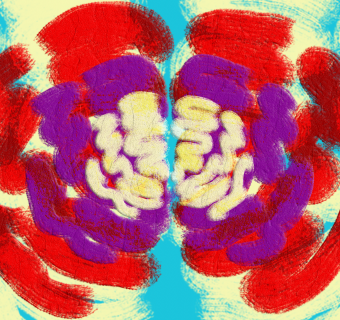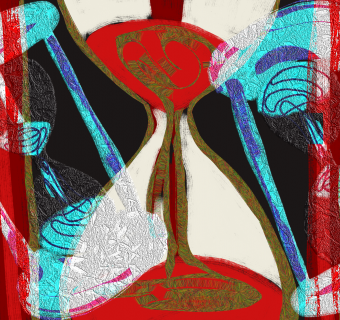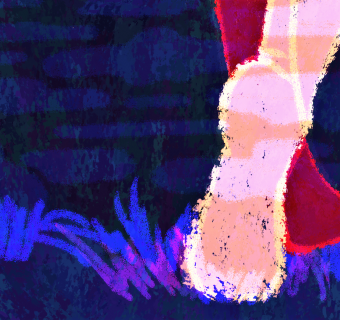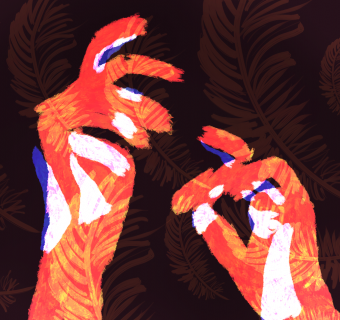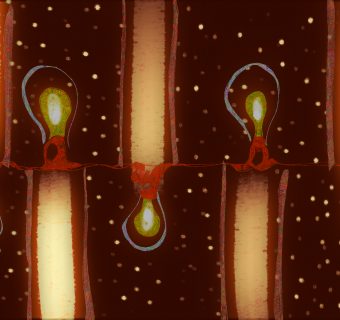“Within the celebration of the erotic in all our endeavors, my work becomes a conscious decision — a longed-for bed which I enter gratefully and from which I rise up empowered. Of course, women so empowered are dangerous.” — Audre Lorde, "Uses of the Erotic: The Erotic As Power"
As I begin my journey into the work world after four years of demanding classes and extracurriculars, it has become more apparent than ever that our society, at the university level and beyond, is one of constant production. I cannot count the times I’ve forfeited a good night’s sleep or a healthy meal in order to produce all that was expected of me, be it in my classes, at work, or otherwise, and I don’t know many others who haven’t done the same. It’s not that I enjoy pulling all-nighters and getting my energy from Celsius, or using my weekends and evenings for productivity instead of rest. Instead, I do these things because it is what our culture necessitates, despite the toll this lifestyle may take on our bodies and minds. It is ingrained in us that incessant work is essential and rest is a luxury. But where does this mindset come from?
Speaking from my perspective as a Black woman in America, I acknowledge that both Black and female identities are intertwined with a history of incessant production that does not benefit us, but rather gives a further advantage to the most privileged in our society. The idea that producing at a high level is desirable perpetuates the use of labor to bolster oppressive systems and those who benefit from them. Deviating from the expectation that our existence is meant to be one of service, allows us to work in ways that benefit us and our communities. This is precisely why Audre Lorde argues that an individual who makes work a “conscious decision” becomes empowered, and able to take control of their own destiny. In her 1978 essay, "Uses of the Erotic: The Erotic As Power", Lorde argues that the erotic is the means by which we can transition from the mindset of service to the oppressor to being empowered in work that is meaningful to us. To her, the erotic is a well of power that lies within all women: a feminine life force of creativity, love, and spirituality. It is deeper than just a physical sensation: it is a resource for a more fulfilling life. By embracing the erotic, our work can become a powerful tool for liberation. Of course, this reimagined manner of working threatens the system built to keep us, all those Lorde speaks to, oppressed. Indeed, this does make people like Lorde “dangerous” to the oppressor, but empowered and free to themselves.
Lorde’s message of work as empowerment, tapping into the erotic that lies within us all, sounds like a much better reality than my all-nighters and working to the point of burnout without the option of slowing down. But how does one actually redefine their reality to fit into Lorde’s framework? As I can’t ask Lorde herself, I have decided to sit with the concepts she discusses and begin deciphering how to apply them to my own life. The following is a list of my own conclusions based on her teachings.
Work. In order to redefine work in the way that Lorde does, I think it is important to align with what I am passionate about and how I want to use my education to help others. Taking general education classes for my first few semesters at college just because they were required definitely felt like work in the traditional sense: a chore, unwanted labor. But present day, when I conduct research on health disparities and learn from professors who have dedicated their career to health equity, this work aligns with Lorde’s perception of a “longed-for bed.” Yes, while such work is time-consuming and takes effort, it brings me joy. Thus it is empowering, and indeed longed-for.
Rest. In the context of the traditional definition of work, relaxation only exists in the space between the previous job and more productivity to follow. When redefining work, we must also redefine rest to be more than simply a pause or break from another activity. It should be an intentional action that is just as necessary as work. In my eyes, it is helpful to view rest as a necessity in order to not pass it by with the intention of achieving something more important. For instance, I find that rest becomes more intentional in my life when I schedule time to rest into my calendar, thus making it just as important as any of my other responsibilities.
Art. Art is part of tapping into the creative, the erotic force within our soul. Through embracing art, we can connect with the erotic within ourselves by spending time in self expression. We can also form deeper connections with others by appreciating the emotional expression necessary to produce a work of art. For me, tapping into this emotional plane takes shape in writing as a creative outlet, as well as attending open mic nights, concerts, and other artistic performances with the intention of embracing and appreciating the feeling and vulnerability of others.
Erotic. The erotic, as described by Lorde, is another concept in need of redefining. The erotic is traditionally spoken about and experienced in a sexual or physical context. When redefining the erotic in accordance with Lorde’s definition, it becomes far more spiritual, far more innate. Lorde teaches that the erotic is a resource for joy, connection, and liberation. By embracing work that one is passionate about, by allowing time for intentional rest, and by embracing connection to the emotions of ourselves and others through art, one can use the erotic as a beacon of light guiding you to joy. To me, embracing the erotic means taking time to myself, in meditation, or in spending time in nature, to learn about this resource that has always been within me, and to learn to trust where it guides me.
Danger. Embracing the erotic, through meaningful work, intentional rest, and emotional connection, allows one to live life in accordance with their own needs and desires. Oneness with the erotic means oneness with a life that not only brings satisfaction, but prioritizes it. Such a relationship with the erotic force within ourselves comes with the ability to harness power over one’s own life, rather than living in accordance with the damaging system we are accustomed to. A person with such a power is dangerous, as they threaten this system that prioritizes overproduction rather than tending to our natural needs. Such a person is dangerous because they become comfortable questioning what they have been taught. Instead of running from danger as I've been taught, this danger is one I choose to befriend.


